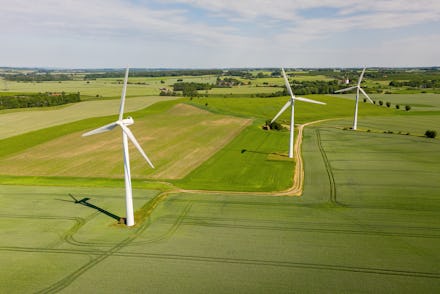We have 6 months to figure out how to make the environmental benefits from coronavirus last, expert says

The International Energy Agency (IEA) is calling for governments around the world to consider a 'green recovery' plan that will utilize sustainability as a way to stimulate a post-lockdown economy while keeping carbon emissions low. Such a plan is important to enact now, Dr. Fatih Birol, the executive director of IEA urged, given the drop in emissions caused by coronavirus. If policymakers fail to act within six months, he warned, the world will be too late to prevent a rebound in carbon emissions, making it exponentially more difficult to tackle the issue in the future.
The pandemic has driven carbon emissions down by 17 percent as people around the world paused their work, travel, and commutes during the lockdowns. But experts were reluctant to get too optimistic, and for good reason: As they predicted, carbon emissions are already returning to pre-coronavirus levels.
But the IEA doesn't believe it has to be this way. The organization has published a report, called the Sustainability Recovery Plan, that shows governments how they can boost their post-coronavirus economies while building a sustainable and resilient future. Dr. Birol, an economist and energy expert, told The Guardian that including sustainability in economic recovery packages could help countries reach their climate goals, but governments must commit to it within 2020; any later would be too late.
"The next three years will determine the course of the next 30 years and beyond," he explained. "If we do not [take action] we will surely see a rebound in emissions. If emissions rebound, it is very difficult to see how they will be brought down in [the] future. This is why we are urging governments to have sustainable recovery packages."
The IEA believes their plan, as detailed in the report, can provide consistent economic growth by an average of 1.1 percentage points per year; save and create about 9 million jobs per year; and lower greenhouse gas emissions by 4.5 billion tons by the end of the three-year plan. Lowering emissions could also drive down air pollution by 5 percent, offer clean-cooking to an estimated 420 million people living in low-income countries, and provide electricity to about 270 million people. Overall, it would cost about $1 trillion per year — which is only 0.7 percent of the global GDP, the IEA pointed out.
"Our Sustainable Recovery Plan provides [policy makers] with rigorous analysis and clear advice on how to tackle today’s major economic, energy, and climate challenges at the same time," Dr. Birol stated in a press release. Furthermore, the report goes to show that cleaner policies aren’t out of reach. "The plan is not intended to tell governments what they must do. It seeks to show them what they can do."
While the U.S. has taken multiple steps back with regard to environmental regulations, reversing climate change policies and supporting high-carbon industries, other countries around the world are considering the opposite as they map out their recovery strategies. A group of 57 charities, representing 22 million members, called for limiting bailouts to low-carbon companies in Britain; over 200 organizations, representing 40 million healthcare workers, have written to G20 leaders to consider a green recovery for the benefit of human health; and the EU commission is formulating a plan that will put billions into home energy efficiency, renewable energies, and zero-emission trains (although monetary relief offered to businesses, including high-carbon businesses, has threatened to derail the focus on greener solutions).
The IEA plan follows a similar route to a green recovery by suggesting policies and investments in low-carbon energy sources, like wind and solar energy, along with modernizing existing energy grids; switching to cleaner private and public transport; improving energy efficiency in buildings and appliances; improving the efficiency of industrial equipment; relying on more sustainable fuels; and encouraging innovation in sustainable technologies. This plan, the IEA believes, can help employ numerous individuals who have lost their jobs during the Covid-19 pandemic, in particular those who lost their energy-related jobs as oil prices crashed.
"Governments have a once-in-a-lifetime opportunity to reboot their economies and bring a wave of new employment opportunities while accelerating the shift to a more resilient and cleaner energy future," Dr. Birol said in the IEA press release.
Overall, experts say a green recovery plan wouldn't just bandage the economic wounds caused by the pandemic, it would also provide the foundation for a more environmentally friendly future that could reduce the risk of humans running into another animal-transferred disease, lower weather-related deaths, and improve our health. But citizens, professionals, and businesses have to keep putting the pressure on policymakers to act quickly — before carbon emissions recover faster than our people.